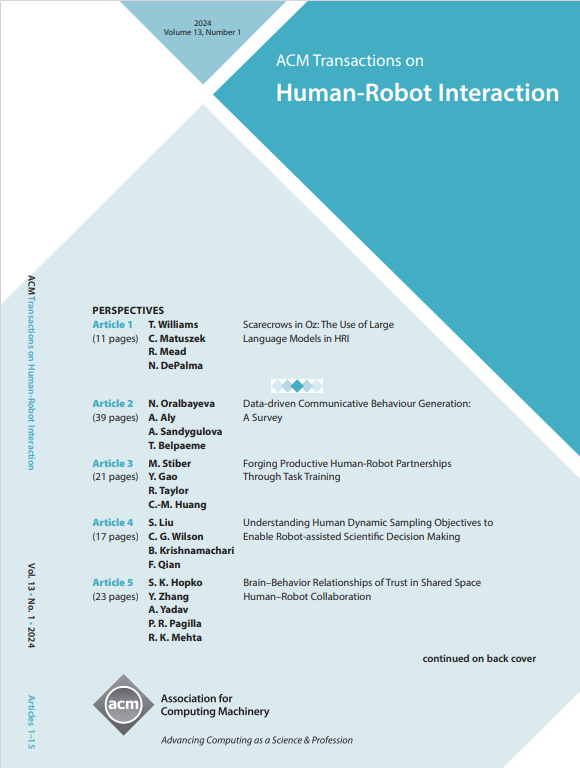Stochastic-Skill-Level-Based Shared Control for Human Training in Urban Air Mobility Scenario
IF 5.5
Q2 ROBOTICS
引用次数: 0
Abstract
This paper proposes a novel stochastic-skill-level-based shared control framework to assist human novices to emulate human experts in complex dynamic control tasks. The proposed framework aims to infer stochastic-skill-levels (SSLs) of the human novices and provide personalized assistance based on the inferred SSLs. SSL can be assessed as a stochastic variable which denotes the probability that the novice will behave similarly to experts. We propose a data-driven method which can characterize novice demonstrations as a novice model and expert demonstrations as an expert model, respectively. Then, our SSL inference approach utilizes the novice and expert models to assess the SSL of the novices in complex dynamic control tasks. The shared control scheme is designed to dynamically adjust the level of assistance based on the inferred SSL to prevent frustration or tedium during human training due to poorly imposed assistance. The proposed framework is demonstrated by a human subject experiment in a human training scenario for a remotely piloted urban air mobility (UAM) vehicle. The results show that the proposed framework can assess the SSL and tailor the assistance for an individual in real-time. The proposed framework is compared to practice-only training (no assistance) and a baseline shared control approach to test the human learning rates in the designed training scenario with human subjects. A subjective survey is also examined to monitor the user experience of the proposed framework.城市空中交通情景下基于随机技能水平的人类训练共享控制
本文提出了一种基于随机技能水平的共享控制框架,以帮助人类新手在复杂的动态控制任务中模仿人类专家。提出的框架旨在推断人类新手的随机技能水平(ssl),并根据推断的ssl提供个性化的帮助。SSL可以被评估为一个随机变量,它表示新手的行为与专家相似的概率。我们提出了一种数据驱动的方法,将新手演示分别表征为新手模型和专家演示分别表征为专家模型。然后,我们的SSL推理方法利用新手和专家模型来评估复杂动态控制任务中新手的SSL。共享控制方案的设计目的是根据推断的SSL动态调整辅助级别,以防止在人工训练期间由于强加的辅助不足而感到沮丧或乏味。在远程驾驶城市空中机动(UAM)车辆的人类训练场景中,通过人体受试者实验证明了所提出的框架。结果表明,所提出的框架可以实时评估SSL并为个人定制帮助。将提出的框架与仅练习训练(无辅助)和基线共享控制方法进行比较,以测试人类受试者在设计的训练场景中的人类学习率。还检查了一项主观调查,以监测拟议框架的用户体验。
本文章由计算机程序翻译,如有差异,请以英文原文为准。
求助全文
约1分钟内获得全文
求助全文
来源期刊

ACM Transactions on Human-Robot Interaction
Computer Science-Artificial Intelligence
CiteScore
7.70
自引率
5.90%
发文量
65
期刊介绍:
ACM Transactions on Human-Robot Interaction (THRI) is a prestigious Gold Open Access journal that aspires to lead the field of human-robot interaction as a top-tier, peer-reviewed, interdisciplinary publication. The journal prioritizes articles that significantly contribute to the current state of the art, enhance overall knowledge, have a broad appeal, and are accessible to a diverse audience. Submissions are expected to meet a high scholarly standard, and authors are encouraged to ensure their research is well-presented, advancing the understanding of human-robot interaction, adding cutting-edge or general insights to the field, or challenging current perspectives in this research domain.
THRI warmly invites well-crafted paper submissions from a variety of disciplines, encompassing robotics, computer science, engineering, design, and the behavioral and social sciences. The scholarly articles published in THRI may cover a range of topics such as the nature of human interactions with robots and robotic technologies, methods to enhance or enable novel forms of interaction, and the societal or organizational impacts of these interactions. The editorial team is also keen on receiving proposals for special issues that focus on specific technical challenges or that apply human-robot interaction research to further areas like social computing, consumer behavior, health, and education.
 求助内容:
求助内容: 应助结果提醒方式:
应助结果提醒方式:


